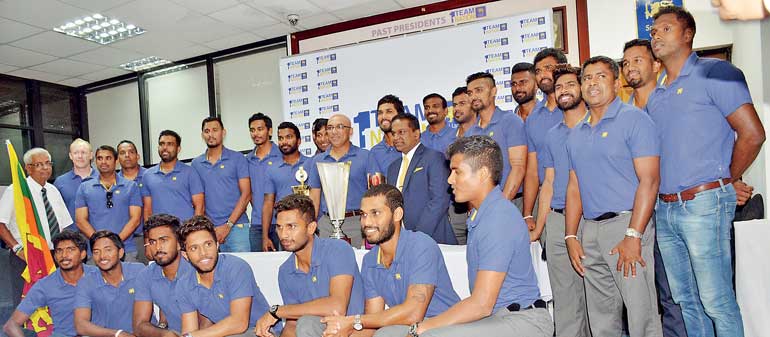Tuesday Feb 17, 2026
Tuesday Feb 17, 2026
Tuesday, 20 February 2018 00:27 - - {{hitsCtrl.values.hits}}


by Madushka Balasuriya
One tour, three formats, three series wins. First tours as head coach don’t come much better than that, and for Chandika Hathurusingha, it has been an ideal start to his tenure as head coach of the Sri Lankan national side.
Speaking on his side’s return to the island nation, a content Hathurusingha cited good communication, tactical flexibility and a relaxed environment as key elements in Sri Lanka’s all-conquering tour.
“[After losing the first two matches on tour] we knew we had the capability to come back. The opposition played really good cricket in the first two games and we took time to get used to the conditions. We also got a few things wrong tactically but we came and corrected it in the next few games,” he explained.
“The biggest help was the environment, which was good for the players. The coaching staff also helped a lot. We also communicated a lot with the players on their concerns and views.We tried to get them to focus on their cricket and perform without worrying too much about the outcome.”
While that sounds easy enough, the swagger and confidence with which Sri Lanka’s batsman eviscerated the Bangladeshi bowling in the tour’s concluding T20s was a sight to behold. It was also indicative of the extent to which the players have bought into Hathurusingha’s ideas.
Injured captain Angelo Mathews half-jokingly compared Hathurusingha’s return to that of a “messiah back with his disciples,” while Dinesh Chandimal reiterated his stance that the side is more of a family than a mere team. It is clear therefore that Hathurusingha’s focus on the collective is paying dividends.
“With me, I don’t think you will see the same team too often. Of course the players that perform have the assurance of their places in the team but will always try and see the best combination that can win games. It’s not that we’re trying to play with just eleven players for the next two years.
“We want a big pool of players for us to compete against different countries and different opposition, depending on their limitations and strengths. All the players get an equal opportunity and they will definitely know where they stand when it comes to selection.”
An ideal example of this newly implemented policy is Jeevan Mendis. Mendis was drafted in after four years out of the national setup and immediately had an impact, picking up 3 wickets in the two T20s, including two in his first over back.
“We know his talent and coupled with his recent domestic record, we knew we wanted a player with Jeevan’s qualities,” explained Hathurusingha of the recall. “It depends on the opposition, depends on the conditions and what we want to achieve. It’s all about flexibility with the team and we have communicated to the players as well and they all know what their roles are. That’s how it’s going to be going forward.
Thisara Perera too has benefited from Hathurusingha’s clear tactical instructions. At 28, Perera is often seen as a bundle of unfulfilled potential.However, in Bangladesh, he offered a glimpse into the destruction that lies within. The powerful left-hander averaged 44.66 over five ODIs scoring 134 runs at a strike rate of 154, while picking five wickets in the process. He saved his best for the two T20s, where his blitzkrieg knocks of 31 and 39* snuffed out any remaining fight from the Bangledeshi bowlers.
“Thisara had come back to the national side after a while and so we spoke to him a lot about his role. We also changed his training methods a bit. We all knew how talented he was but he just needed to harness that better. We are now seeing what he’s capable of. I think he still has room to improve and room to contribute but it all depends on the roles and opportunities that he gets.”
Sri Lanka’s next test is a stern one in the Nidahas Trophy, where they will face a wounded Bangladesh unit and an Indian side at the top of their game. Hathurusingha though, despite speaking of the team’s immense potential, is not too concerned about the results.
“We can definitely go and compete with bigger teams but in cricket, you can’t guarantee results. What we can assure and try to aspire to is to try and get better every time we train, every time we play and try to do our best. As long as we play to our potential, I’m happy because the more we play to our potential, more often than not we will win.”
Pix by Shehan Gunesekera